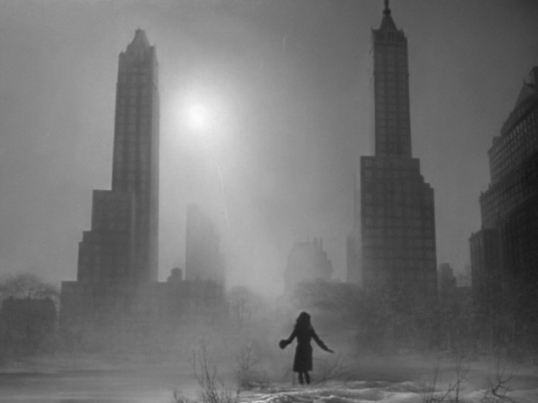/Portrait of Jennie/ and Euripides, fr. 833
I recently saw for the first time Portrait of Jennie (1948), directed by William Dieterle and produced by David O. Selznick. In the main rôles are Joseph Cotten and Jennifer Jones, with an essential supporting performance by Ethel Barrymore. I don’t know if I’ll write about it further, but I’m still thinking over the film, which I found both haunting and comforting. (Has anyone compared it with Vertigo, I wonder?) I’m already looking forward to watching it again. (See The Nitrate Diva here for some reflections on the film that will make you want to watch it, too.)
The film opens with a kind of spoken philosophical proem, and includes onscreen quotations by Euripides and Keats, the latter the well-known “Beauty is truth, truth beauty…” The former quotation is far less known. On the screen, only the author is named, no source, but a little searching reveals that it is a fragmentarily surviving set of lines from the playwright’s Phrixus. (On Phrixus, whose actions will be necessary for the later Golden Fleece tale, in Greek mythology, see here.) These lines — now known as Euripides, fr. 833 — survive thanks to their having been quoted by the great topical anthologist Stobaeus (5th cent. CE), whom we have to thank also for many other lines that would otherwise be lost.
So here is the fragment in Greek from Stobaeus, Anth. 4.52b.38, and my own translation.
Εὐριπίδου Φρίξῳ (fr. 833)
Τίς δ’ οἶδεν εἰ ζῆν τοῦθ’ ὃ κέκληται θανεῖν,
τὸ ζῆν δὲ θνῄσκειν ἐστί; πλὴν ὅμως βροτῶν
νοσοῦσιν οἱ βλέποντες, οἱ δ’ ὀλωλότες
οὐδὲν νοσοῦσιν, οὐδὲ κέκτηνται κακά.
My translation:
Who knows if life is that called death,
If living is dying? But in any case, mortals
That live suffer, while those who’ve died
Neither suffer nor own any ills.
There are no real difficulties in the text, but for budding Greek readers, here are a couple of notes:
- βλέπω here, to live (ellip. for βλέπω φάος to see light)
- ὀλωλότες perf ptcp mpl ὄλλυμι : ὄλωλα to have perished, to be dead, ruined
There are similar ideas about death in Epicurus‘ famous Letter to Menoeceus. Note these lines (Greek from D.A. Russell, An Anthology of Greek Prose, pp. 142-144; Eng. tr. is my own):
Συνέθιζε δὲ ἐν τῷ νομίζειν μηδὲν πρὸς ἡμᾶς εἶναι τὸν θάνατον· ἐπεὶ πᾶν ἀγαθὸν καὶ κακὸν ἐν αἰσθήσει, στέρησις δέ ἐστιν αἰσθήσεως ὁ θανατός. ὅθεν γνῶσις ὀρθὴ τοῦ μηθὲν εἶναι πρὸς ἡμᾶς τὸν θάνατον ἀπολαυστὸν ποιεῖ τὸ τῆς ζωῆς θνητόν, οὐκ ἄπειρον προστιθεῖσα χρόνον ἀλλὰ τὸν τῆς ἀθανασίας ἀφελομένη πόθον. οὐθεν γάρ ἐστιν ἐν τῷ ζῆν δεινὸν τῷ κατειληφότι γνησίως τὸ μηδὲν ὑπάρχειν ἐν τῷ μὴ ζῆν δεινόν. ὥστε μάταιος ὁ λέγων δεδιέναι τὸν θάνατον οὐχ ὅτι λυπήσει παρών, ἀλλ᾽ ὅτι λυπεῖ μέλλων· ὃ γὰρ παρὸν οὐκ ἐνοχλεῖ, προσδοκώμενον κενῶς λυπεῖ, τὸ φρικωδέστατον οὖν τῶν κακῶν ὁ θάνατος οὐθὲν πρὸς ἡμᾶς, ἐπειδήπερ ὅταν μὲν ἡμεῖς ὦμεν, ὁ θάνατος οὐ πάρεστιν, ὅταν δὲ ὁ θάνατος παρῇ, τὀθ᾽ ἡμεῖς οὐκ ἐσμέν. οὔτε οὖν πρὸς τοὺς ζῶντάς ἐστιν οὔτε πρὸς τοὺς τετελευτηκότας, ἐπειδήπερ περὶ οὓς μὲν οὐκ ἔστιν, οἳ δ᾽ οὐκέτι εἰσίν.
Learn to think of death as nothing for us, since everything good or bad is so in perception, and death is the privation of perception. From this a proper thinking about death as nothing for us makes life’s liability to death enjoyable, not because it has added limitless time to life, but because it has taken away the longing for deathlessness, for there is nothing frightful in living for one who has really grasped the fact that there is nothing frightful in not living. So it is pointless to tell people to fear death, not because it will cause distress when it comes, but because it causes distress when it is yet to come, for anything that is not bothersome when it is present, causes distress for no reason when it is only expected. The most terrible of evils, then, death, is nothing for us, since, when we are, death is not present, and when death is present, then we are not. It has nothing to do, then, with the living, nor with those who have died, since for the former it does not exist, and the latter themselves no longer exist.
This is all well and good, but there is nothing here about the pain for the living caused by the absence of the dead.
To return to the film, I’ll close with this clip from near its beginning, at the end of which is Jennie’s song:
Where I come from, nobody knows
And where I am going, everything goes
The wind blows,
The sea flows
Nobody knows
And where I am going, nobody knows
